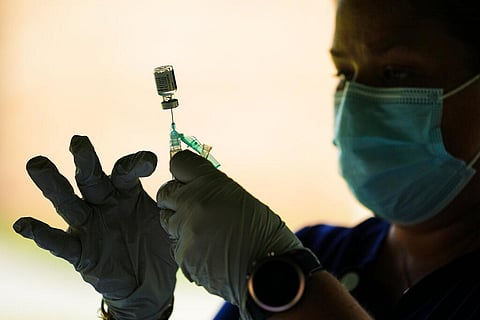

WASHINGTON: As the world is embracing to fight against the new Covid-19 variant, Omicron, the scientists at Walter Reed Army Institute of Research (WRAIR) of the US Army are expected to announce that they have developed a new vaccine which effectively will fight against all Covid-19 variants.
Aimed to address the current pandemic situation, the vaccine will be rolled out within weeks.
According to the Defense One report, the achievement is the result of almost two years of work on the virus.
The US Army lab received its first DNA sequencing of the Covid-19 virus in early 2020. Very early on, Walter Reed's infectious diseases branch decided to focus on making a vaccine that would work against not just the existing strain but all of its potential variants as well, the report said.
The Walter Reed Army Institute of Research is the largest biomedical research facility administered by the US Department of Defense.
Walter Reed's Spike Ferritin Nanoparticle Covid-19 vaccine, or SpFN, completed animal trials earlier this year with positive results.
Phase 1 of human trials, which tested the vaccine against Omicron and the other variants, wrapped up this month, again with positive results that are undergoing final review, Dr. Kayvon Modjarrad, director of Walter Reed's infectious diseases branch said, claimed the report.
"It's very exciting to get to this point for our entire team and I think for the entire Army as well," Modjarrad said, the report added.
"Our strategy has been to develop a 'pan-coronavirus' vaccine technology that could potentially offer safe, effective and durable protection against multiple coronavirus strains and species."
The vaccine's human trials took longer than expected, he said, because the lab needed to test the vaccine on subjects who had neither been vaccinated nor previously infected with Covid.
Increasing vaccination rates and the rapid spread of the Delta and Omicron variants made that difficult. "With Omicron, there's no way really to escape this virus. You're not going to be able to avoid it. So I think pretty soon either the whole world will be vaccinated or have been infected," Modjarrad said, the report added.
Pre-clinical studies published in Science Translational Medicine indicate that the SpFN vaccine protects non-human primates from disease caused by the original strain of SARS-CoV-2 and induces highly-potent and broadly-neutralising antibody responses against major SARS-CoV-2 variants of concern including the SARS-CoV-1 virus that emerged in 2002, the statement read.
WRAIR developed a secondary candidate vaccine, a SARS-CoV-2 Spike Receptor-Binding Domain Ferritin Nanoparticle (RFN) vaccine, which targets a smaller part of the coronavirus Spike protein than the SpFN vaccine. Results from a study, published recently in the Proceedings of the National Academy of Sciences, show that this vaccine potentially offers similar protection against an array of SARS-CoV-2 variants and SARS-CoV-1.
"The RFN vaccine candidate is more compact and has some natural advantages as we try to increase the immune response against multiple coronaviruses using a single vaccine platform, so it is still under consideration as part of our pan-coronavirus vaccine development pipeline," said WRAIR structural biologist and vaccine co-inventor, Dr Gordon Joyce.